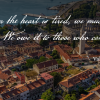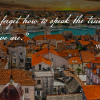
Published: March 31, 1999
View the Original Newsletter: Iskra-31.pdf
About This Issue
This issue captures the shock and moral debate surrounding the start of NATO’s air campaign against Serbia/Yugoslavia and the unfolding Kosovo tragedy, set against the solemn hope of Easter. It blends a forceful Motrišta essay on the ethics of intervention, the editor’s Easter note from Toronto, fast-moving news from Croatia and the region, community notices in Canada, culture, health, and sport.
Motrišta: “It Has Begun”
The lead commentary argues that after a decade of aggression in Slovenia, Croatia, and Bosnia and Herzegovina, the world finally acted in Kosovo. It frames NATO’s operation as a response born of humanitarian duty rather than oil or geopolitics, contending that Serbia’s leadership fused itself to a destructive national will and that only decisive force could stop further ethnic cleansing. The author urges moral support for NATO countries and foresees the necessary defeat of Greater-Serbian militarism.
From the Editor’s Desk
Writing on the eve of Easter, the editor reflects on years of Croatian and Bosnian suffering and on the bitter irony that, when Croats rallied the world, they rarely received the media platform now afforded to Belgrade’s spokesmen. There is relief that “justice is finally falling from the sky,” gratitude to NATO and Canada, and a holiday wish for readers despite the heavy moment.
Headlines and Reports
Airports in Croatia were temporarily closed on March 24 as regional airspace tightened. The Croatian Foreign Ministry urged citizens not to travel to Yugoslavia. In Belgrade, a crowd attacked the Croatian Embassy amid anti-NATO protests. Legal voices in Zagreb pressed The Hague to indict Slobodan Milošević; Arkan was confirmed on a sealed indictee list. Polling in Croatia showed strong public approval for the NATO action. In Bosnia and Herzegovina, Croatian officials ended a brief boycott of federal bodies following the fatal attack on Deputy Interior Minister Jozo Leutar. Kosovo dispatches relayed grim accounts of killings, disappearances, and fear for opposition figures.
Special Files and Features
The middle of the issue assembles documentation and analysis around the crisis: a Government of Croatia statement, a chronology of the opening air sorties, and commentary such as “Stopping Milosevic.” A report attributes covert “western commandos in Serbia” to General Ante Roso; another surveys the fate of Yugoslav aircraft on the ground. A long press-watch section gathers regional and international perspectives. The back pages return to Motrišta, closing the circle on the month’s theme.
Community and Diaspora
Notices span English-language classes for newcomers, parish and association programming, and a Toronto event with journalist Maja Freundlich organized by AMCA. Letters include Easter greetings from U.S. prisoner Ante Ljubas and a supportive note from Mississauga praising the paper’s growing quality and reach. An obituary honors Rev. Ilce Miovski of the Macedonian Orthodox Church in Toronto, remembered for his friendship with Croats and commitment to national freedom.
Culture, City, Home
“Lijepom Našom” gathers short cultural items and everyday sketches, including a warm vignette on Zagreb’s Grič cannon and city memory. Household pages offer recipes and tips, while a humor column spins village capers and tax men into gentle satire.
Health
A practical health essay explains the role of water and beverages in nutrition and includes a note on arthritis, keeping the section focused on simple habits readers can apply immediately.
Sport
UEFA postponed the March 27 Yugoslavia–Croatia qualifier in Belgrade and reiterated its stance that politics and football should remain separate, even as international federations weighed sanctions in other sports. The domestic roundup touches volleyball, basketball, and scheduling shifts caused by the crisis.
Closing Thought
Between Easter prayers and air-raid sirens, the issue asks readers to hold two truths at once: justice can require force, and reconciliation still demands courage. It is an archive of a turning point, but also a reminder of why Croatia’s hard-won freedom continues to matter.




